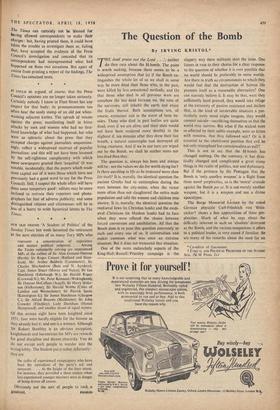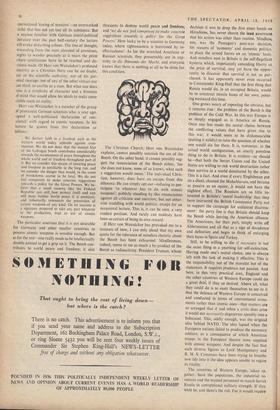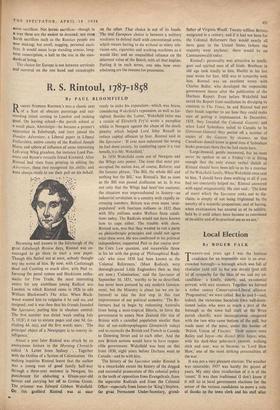The Question of the Bomb
By IRVING KRISTOL* HE dead praise not the Lord . . .'; neither I do they care about the H-bomb. The point is worth making, because there seems to be a widespread assumption that (a) if the Bomb ex- tinguishes the whole lot of us we shall in some way be more dead than those who, in the past, were killed by less sensational methods; and (b) that those who died in all previous wars are somehow the less dead because we, the sons of the survivors, still inhabit the earth and enjoy the fruits thereof. Both assumptions are, of course, erroneous and in the worst of taste be- sides. Those who died in past battles are quite dead, even if we are alive; and their state would not have been rendered more deathly in the slightest if, ten minutes after they drew their last breath, a natural catastrophe had destroyed all living creatures. And if we in our turn are wiped out by the Bomb, we shall be neither more nor less dead than they.
The question is, always has been and always will be : are the values we die for worth dying for? Is there anything in life to be treasured more than life itself? It is, morally, the identical question the ancient Greeks had to contemplate during the wars between the city-states, when the victor more often than not slaughtered the entire male population and sold the women and children into slavery. It is, morally, the identical question the mediaeval Jews (in Christian lands) and the medi- aeval Christians (in Moslem lands) had to face when they were offered the choice between forced conversion and annihilation. All that the Bomb does is to pose this question concretely to each and every one of us. It universalises and makes common what was once an extreme situation. But it does not transcend that situation.
One of the more melancholy aspects of the King-Hall/ Russell /Priestley campaign is the slippery way these militants skirt the issue. One listens in vain to their chorus for a clear response to the question of whether it is ever possible that no world should be preferable to some worlds. Are there in truth no circumstances to which they would feel that the destruction of human life presents itself as a reasonable alternative? One can scarcely believe it. It may be that, were they sufficiently hard pressed, they would take refuge at the extremity of passive resistance and declare that, in the kind of intolerable situation a par- ticularly nasty mind might imagine, they would commit suicide—sacrificing themselves so that the world may survive. But what if the wicked were so affected by their noble example, were so bitten with remorse, that they followed suit? Or is it essential to the abolitionist position that evil be not only triumphant but conscienceless as well?
This is not to say that the H-bomb has changed nothing. On the contrary, it has dras- tically changed and complicated a great many things in the realm of politics, war and diplomacy. But if the pretence by the Pentagon that the Bomb is 'only another weapon' is a flight from these novel perplexities, so is the 'moral' crusade against the Bomb per se. It is not merely another weapon; but it is a weapon and not a divine apocalypse.
The Burge Memorial Lecture by the noted German physicist Carl-Friedrich von Weiz- sackert shows a fine appreciition of these per- plexities. Much of what he says about the difficulty inherent in such an 'absolute' deterrent as the Bomb, and the various temptations it offers to a political leader, is very sound if familiar. So are many of his remarks about the need for an * Co-editor of Encounter.
t ETHICAL AND POLITICAL PROBLEMS OF THE ATOMIC AGE. (SCM Press, 2s.)
aternational 'easing of tensions'—an overworked Ache that has not yet lost all its substance. But n anyone familiar with German moral-political iterature over the past half-century the lecture vill evoke disturbing echoes. The line of thought, 3roceeding from the most elevated of premisses, )egins to wander precisely as it nears the point ,where conclusions have to be reached • and de- .isions made. Of Herr von Weizsfickcr's profound ;incerity as a Christian there can be no doubt; aor of his scientific authority; nor of his per- sonal courage; nor of any of the other virtues one zan think to ascribe to a man. But what one does niss is a simplicity of character and a firmness of mind that would allow his ideals to make some visible mark on reality.
Herr von Weizsiicker is a member of the group of prominent German scientists who, a year ago, ;igned a well-publicised 'declaration of con- science' with regard to atomic weapons. In his lecture he quotes from this declaration as follows :
We declare faith in a. freedom such as the western world today upholds against com- munism. We do not deny that the mutual fear of the hydrogen bomb contributes considerably towards the maintenance of peace throughout the whole world and of freedom throughout part of it. But we consider this means of ensuring peace and freedom as unreliable in the long run, and we consider the danger that would, in the event of breakdown, accrue to be fatal. We do not feel competent to make concrete suggestions towards a policy for the Great Powers. We be- lieve that a small country like the Federal Republic can still best protect itself and can still most further world, peace if it positively and voluntarily renounces the possession of atomic weapons.of any kind. On, no account is a signatory prepared to take any part whatever in the production, trial or use of atomic weapons.
The particular assertion that it is not desirable for Germany and other smaller countries to possess atomic weapons is sensible enough. But as for the rest—one really needs to be intellectually double-jointed to get a grip on it. The Bomb con- tributes to world peace and freedom; it also threatens to destroy world peace and freedom; and 'we do not feel competent to make concrete suggestions towards a policy for the Great Powers.' How lucky to be a scientist in Germany today, where righteousness is buttressed by in- effectualness! As for the wretched American or Russian scientists, they presumably are in cap- tivity to die Damonie der Mach!, and everyone knows that there is nothing at all to be done for this condition.
The Christian Church, Herr von Weizsiicker explains, cannot possibly sanction the use of the Bomb. On the other hand, it cannot possibly sug- gest the renunciation of the Bomb either, 'for she does not know, none Of us knows, what such a suggestion would mean.' The individual Chris- tian, however, does have an escape from this dilemma. He can simply opt out—refusing to par- ticipate 'in whatever has to do with atomic weapons'; publicly standing by this renunciation against all criticism and coercion; but not other- wise meddling with world politics, except for an occasional lecture. This is, it can be seen, a very modest position. And rarely can modesty have been so certain of being its own reward.
If Herr von Weizsiicker has provoked me to a testiness of tone, I can only plead that my own quota for the tolerance of mindless rhetoric about the Bomb has been exhausted. Mindlessness, indeed, seems to me as much a by-product of the Bomb as radioactivity. President Truman, whose decision it was to drop the first atom bomb on Hiroshima, has never shown the least awareness that his action was other than routine. Mindless, too, was the Pentagon's post-war decision, for reasons of 'economy' and domestic politics, to place the armed forces on an 'atomic' basis. And mindleSs now in Britain is the self-flagellant hysteria which, impetuously conceding liberty as the price of survival, may yet have the oppor- tunity to discover that survival is not so pur- chased. It has apparently never even occurred to Commander King-Hall that the first thing that Russia would do, in an occupied Britain, would be to construct missile bases of her own, point- ing westward this time.
One grows weary of repeating the obvious, but it remains true : the problem of the Bomb is the problem of the Cold War. In this war Europe is as deeply engaged as is America or Russia. Once one has made the moral choice between the conflicting values that have given rise to this war, it would seem to be dishonourable (putting it mildly) to raise the question of whether one would die for them. It is, moreover, in the actual world configuration, an utterly pointless thing to do in Britain. It is evident—or should be—that both the Soviet Union and the United States are willing to risk world destruction rather than survive in a world dominated by the other. This is a fact. And even if every Englishman put on a dhoti, chanted the Mahabharata, and became as passive as an oyster, it would not have the slightest effect. The Russians are so little in- terested in Britain's 'moral leadership' that they have instructed the British Communist Party not to support the campaign for unilateral disarma- ment : the party line is that Britain should keep the Bomb while leaving, the American alliance. The Americans, for their part, simply write off Aldermaston and all that as a sign of decadence and defeatism and begin to think of enlarging their bases in Spain and Turkey.
Still, to be willing to die if necessary is not the same thing as a yearning for self-extinction. Having made one's moral choice, one is always left with the task of making it effective. This is the responsibility not of the moralist but of the statesman. It requires prudence not passion. And here, in this very practical area, England and the other countries of Western Europe could do a great deal, if they so desired. Above all, what they could do is to exert themselves to see to it that the defence of Western Europe is conceived and conducted in terms of conventional arma- ments rather than atomic ones—that matters are so arranged that if and when a crisis does arise it would not necessarily degenerate speedily into a holocaust. This, oddly enough, was the original idea behind NATO. The idea lapsed when the European nations failed to produce the necessary soldiers, as a consequence of which American troops in the European theatre were supplied with atomic weapons. And despite the fact that such diverse figures as Lord Montgomery and R. H. S. Crossman have been trying to breathe new life into it the idea appears unable to regain its vitality.
The countries of Western Europe, taken to- gether, have the population, the industrial re- sources and the trained personnel to match Soviet Russia in conventional military strength. If they want to; and there's the rub. For it would require some sacrifices. Not heroic sacrifices—though in a way these are the easiest to demand; not even harsh sacrifices such as the Russian people are now making; but small, nagging, personal sacri- fices. It would mean large standing armies, long- term conscription, a halt to the rise in the stan- dards of living.
The choice for Europe is not between servitude and survival on the one hand and catastrophe on the other. That choice is out of its hands. The real European choice is between a military readiness to defend itself with conventional arms, which means having to do without as many tele- vision sets, cigarettes and washing machines as, it would like; and an unqualified reliance on the deterrent value of the Bomb, with all that implies. Putting it in such terms, one sees how over- whelming are the reasons for pessimism.






























 Previous page
Previous page